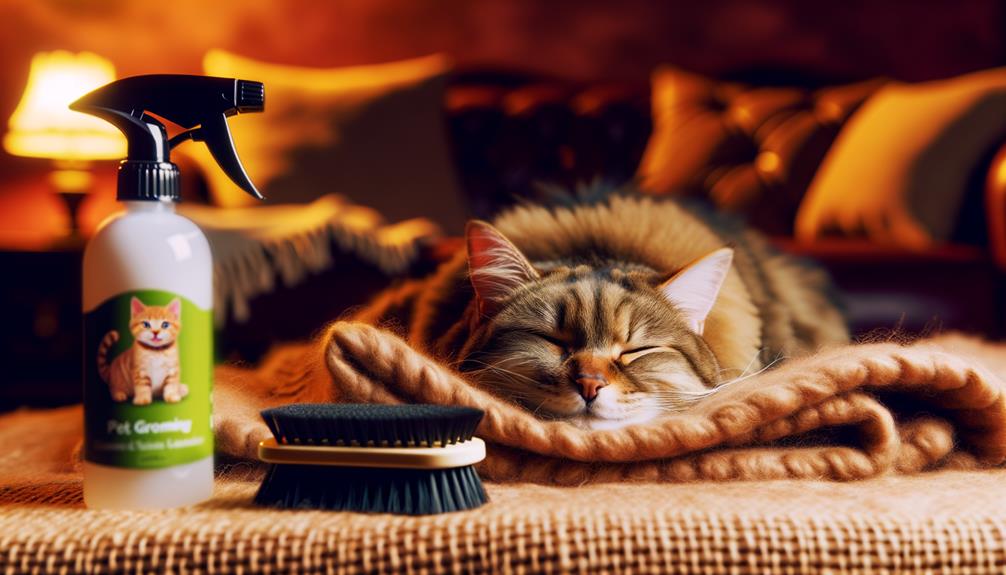If you're looking to keep your cat smelling fresh without the hassle of a bath, start by considering their diet and grooming habits. A balanced diet rich in high-quality proteins and probiotics can work wonders for digestive health, which in turn helps minimize odors. But that's not all; regular brushing and the occasional use of grooming wipes can also play an essential role. Want to know how dental care and a clean environment fit into this equation? Let's explore further steps to keep your feline friend smelling their best.
Check Their Diet
Have you thought about how your cat's diet might be affecting their odor? It's often overlooked, but a balanced diet plays an essential role in managing your cat's overall health and minimizing unpleasant odors. Poor nutrition can lead to digestive issues, which are a primary source of bad smells. Ensuring your cat consumes high-quality protein is vital for their digestive health and can greatly reduce these odors.
Food allergies are another important factor to take into account. Cats can develop allergies to certain ingredients in their diet, leading to skin issues that cause additional odors. Regularly monitoring what your cat eats and consulting with a veterinarian can help identify and eliminate problematic ingredients from their diet, promoting healthy skin and reducing odor.
Probiotics are a valuable addition to your cat's diet. They support digestive health by maintaining a healthy balance of gut bacteria, which can minimize gas and, consequently, reduce unpleasant odors. Including probiotic-rich foods or supplements can be a simple yet effective step toward improving your cat's digestive health and overall well-being.
Hydration is equally important. Providing fresh water regularly prevents dehydration, which can lead to dry, flaky skin and associated odors. Keeping your cat well-hydrated promotes healthy skin, further contributing to a fresher smell.
Grooming Habits
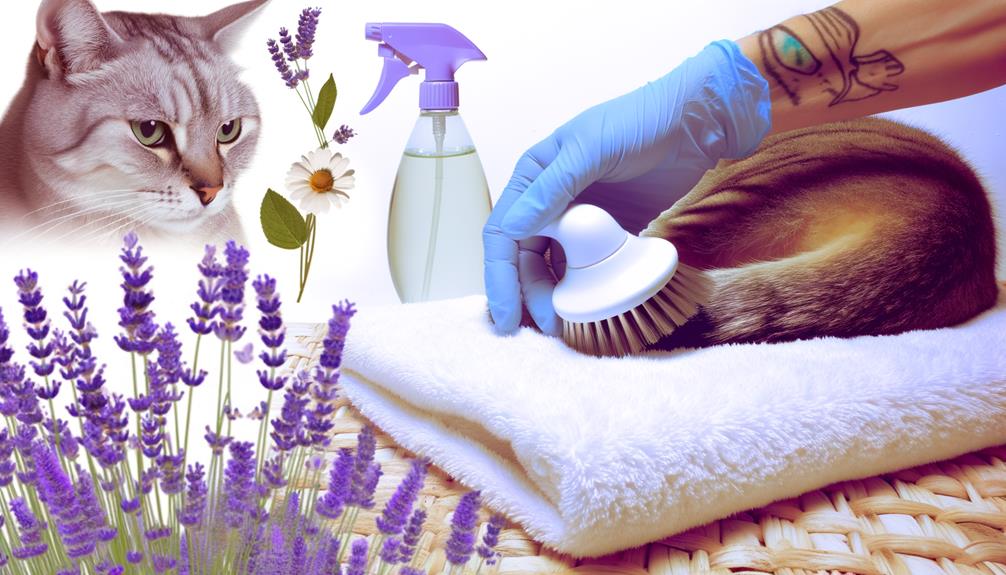
When it comes to maintaining your cat's cleanliness and reducing unpleasant odors, consistent grooming habits are crucial. Regular cleaning through brushing is a cornerstone of effective Cat Grooming. By brushing your cat, you remove loose fur, dirt, and dander, considerably reducing the chances of unpleasant smells. For long-haired breeds, a specialized grooming brush can be particularly beneficial, preventing matting and minimizing the accumulation of dirt that leads to odor issues.
Elderly or overweight cats often struggle with self-grooming. In such cases, giving them a helping hand by brushing more frequently can maintain their hygiene and reduce odors. Regular cleaning sessions should involve not just brushing but also using grooming wipes specifically designed for pets. These wipes offer a quick and efficient solution for cleaning areas prone to dirt and grease between more thorough grooming sessions or baths.
Additionally, trimming the fur around your cat's paws and rear can be a crucial part of your grooming routine. This practice prevents messes from clinging to their fur and enhances overall cleanliness, ultimately contributing to a fresher smell. Consistent grooming not only keeps them clean but also aids in preventing the buildup of unpleasant smells.
Dental Care
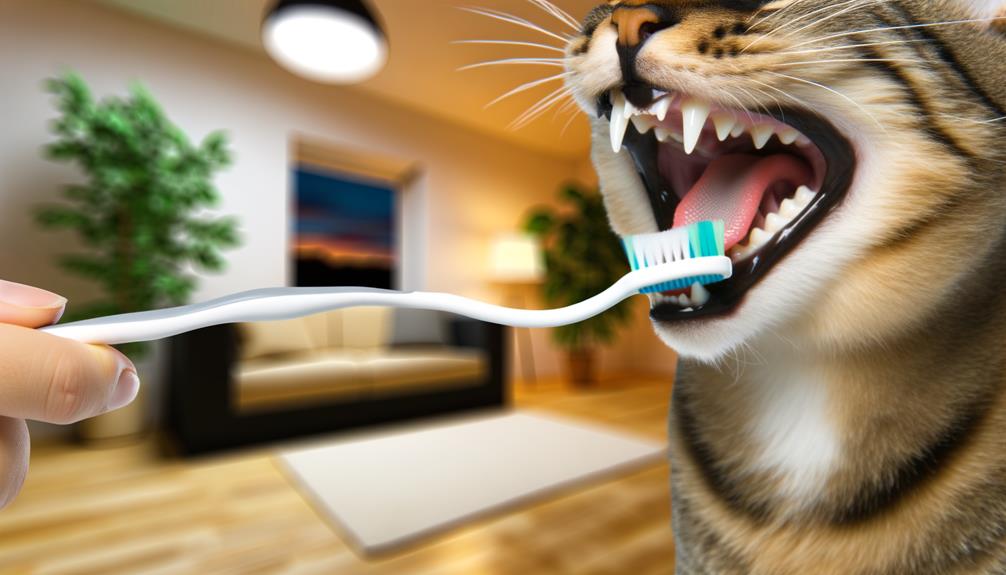
Maintaining your cat's dental care is indispensable for preventing bad breath and guaranteeing overall health. Dental disease is a common issue among cats, leading to the accumulation of bacteria that causes foul odors. Consequently, investing time in your cat's oral hygiene is critical.
One of the most effective methods to reduce plaque buildup and maintain fresh breath is by brushing your cat's teeth at least two to three times a week. Use a cat-specific toothpaste and toothbrush to guarantee safety and effectiveness. This routine helps to remove food particles and bacteria, which can otherwise lead to dental disease.
In addition to brushing, providing natural dental treats can be a beneficial supplement. These treats are specifically designed to control plaque and tartar, contributing to better oral hygiene and odor reduction.
Here's a concise list of steps to improve your cat's dental care:
- Brush your cat's teeth: Aim for two to three times a week using cat-specific products.
- Offer dental treats: Choose treats designed to reduce plaque and tartar buildup.
- Schedule annual veterinary check-ups: Professional cleanings can catch and address underlying dental issues.
- High-quality diet: Feed your cat a diet with low fillers to promote better dental health and minimize bad breath.
- Seek veterinary advice: Always consult your vet for tailored dental care recommendations.
Waterless Mousse
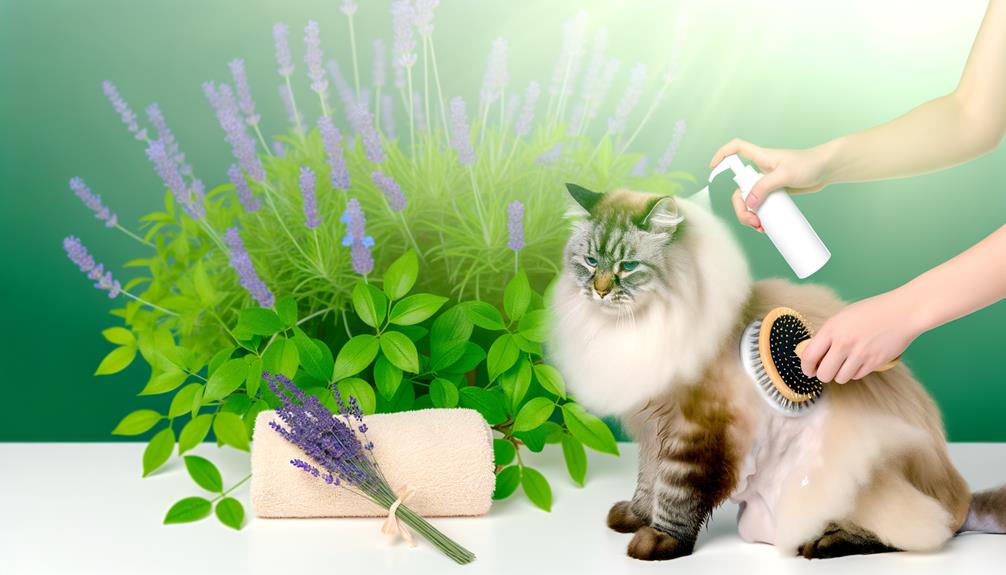
Waterless mousse offers an efficient way to keep your cat's coat clean without the hassle of a full bath, making it perfect for quick touch-ups. Simply apply the mousse to your cat's fur and massage it in, allowing it to neutralize odors and leave a fresh scent. Confirm the product is pH balanced and sulfate-free to avoid skin irritation and maintain coat health.
Easy Application Process
For a quick and hassle-free way to keep your cat's coat fresh and clean, consider using a waterless mousse. This method integrates seamlessly into your cat's cleaning routine, providing an easy application that both deodorizes and maintains the health of your cat's coat. The process is simple and requires minimal effort, making it perfect for those quick touch-ups in between full grooming sessions.
To apply the waterless mousse, follow these steps:
- Apply a small amount: Dispense a modest quantity of mousse into your hand.
- Massage thoroughly: Gently work the mousse into your cat's coat, guaranteeing even distribution.
- Towel dry: Use a towel to absorb any excess product, helping to leave the fur clean and fresh.
- Choose the right product: Confirm the mousse is pH balanced and sulfate-free to avoid skin irritation.
- Regular application: Incorporate this into your regular cleaning routine to keep your cat's coat healthy and odor-free.
Using products like Hepper Waterless Cat Shampoo, which are specifically formulated for feline use, guarantees a gentle yet effective cleaning experience. This approach to cat grooming is ideal for pets that resist traditional bathing methods, offering a stress-free solution to coat maintenance.
Effective Odor Control
When it comes to managing your cat's odor effectively, a waterless mousse can be an excellent solution. This innovative product allows you to clean your cat's coat without the need for water, making it a less stressful experience for your feline friend. By simply applying the mousse to your cat's coat and massaging it in, you can effectively remove odors and dirt, guaranteeing ideal odor control.
Waterless mousse acts as a convenient alternative to traditional pet shampoo, especially when bathing is not feasible. It's crucial to choose a waterless mousse that is pH balanced and sulfate-free to prevent skin irritation and maintain the health of your cat's coat. Regular application can help keep your kitty smelling fresh and reduce the frequency of traditional baths.
For busy pet owners, waterless mousse offers an easy-to-use solution to manage unpleasant smells. Its design guarantees quick application, allowing you to maintain a clean and pleasant-smelling cat with minimal effort. Incorporating waterless mousse into your cat's grooming routine can greatly enhance their coat condition and overall hygiene, providing effective odor control without the hassle of a full bath.
Regular Brushing
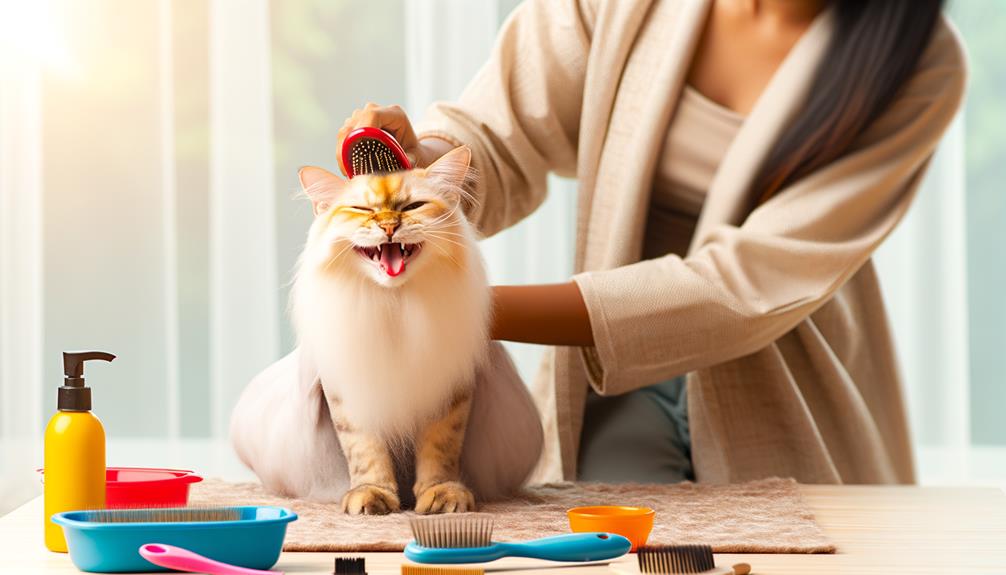
Regular brushing is crucial for reducing loose fur and minimizing dirt accumulation in your cat's coat. By incorporating a consistent brushing routine, you effectively remove debris and dander, considerably decreasing the odors that can build up over time. Use the appropriate brush for your cat's fur type to guarantee best results and maintain a fresh-smelling, healthy coat.
Reduce Loose Fur
Although often overlooked, brushing your cat regularly is important for maintaining a pleasant odor and overall coat health. Regular brushing helps to remove loose fur, dirt, and dander, which greatly reduces unpleasant smells associated with fur buildup. By incorporating brushing into your cat's grooming routine, you not only minimize loose fur but also stimulate the skin's natural oils, leading to a healthier and shinier coat.
For long-haired cats, daily brushing is essential to prevent matting and odor. Short-haired breeds benefit from weekly grooming sessions. A slicker brush is an effective tool for capturing loose hair and debris, guaranteeing your cat's coat remains clean and odor-free.
Consider the following benefits of regular brushing:
- Removes loose fur, reducing shedding and odors
- Captures dirt and dander, minimizing unpleasant smells
- Prevents matting in long-haired cats
- Stimulates natural oils for a healthier coat
- Allows early identification of any skin or coat issues
Establishing a consistent grooming routine is important for your cat's hygiene and overall well-being. By regularly brushing your cat, you make certain they stay clean, healthy, and free from unpleasant odors.
Minimize Dirt Accumulation
Incorporating regular brushing into your cat's grooming routine is vital for minimizing dirt accumulation and guaranteeing a pleasant scent. By brushing your cats at least once a week, you effectively remove loose fur, dirt, and dander, which greatly reduces unpleasant odors in their coat. For long-haired breeds, daily brushing is highly recommended to prevent matting and maintain cleanliness, contributing to a fresher-smelling pet.
Regular brushing not only helps keep your cat fur free of dirt but also stimulates the natural oils in their skin. These oils are essential for promoting a healthier and shinier coat, which in turn assists in keeping your cat smelling fresh. When selecting grooming tools, it's important to utilize specialized brushes designed specifically for your cat's coat type. This enhances the effectiveness of your grooming efforts and further decreases the likelihood of odor build-up.
Additionally, incorporating regular brushing into your cat's routine can serve as a bonding activity. This makes the grooming process a positive experience for both you and your pet, encouraging cooperation and reducing stress. By adhering to these guidelines, you guarantee a cleaner, healthier, and more pleasant-smelling cat.
Clean Environment
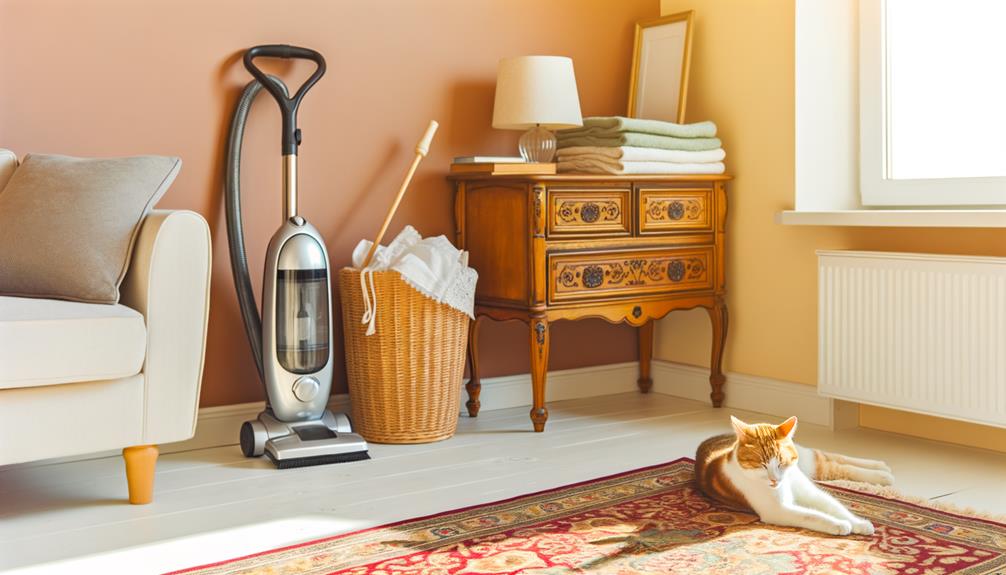
Maintaining a clean environment is vital to ensuring your cat smells good. One of the most effective ways to manage cat odours without giving your cat a bath is to keep your home clean and fresh. Regular maintenance of your cat's surroundings greatly reduces the likelihood of unpleasant smells.
To establish a clean environment, follow these important steps:
- Regularly wash cat bedding: At least once a week, wash your cat's bedding to eliminate trapped odors and maintain a fresh space for your feline friend.
- Clean litter boxes daily: Scoop and refresh the litter box daily. Consistent maintenance prevents smell accumulation and promotes better hygiene.
- Use odor-neutralizing sprays: Apply these sprays in common areas to combat lingering pet odors, ensuring your home remains pleasant-smelling.
- Vacuum frequently: Aim to vacuum at least once a week. This helps remove fur and dander, major contributors to unpleasant cat smells in your home.
- Ensure proper ventilation: Open windows and use air purifiers to reduce stale odors and improve air quality. Proper airflow is essential in maintaining a fresh-smelling home.
Vet Visits
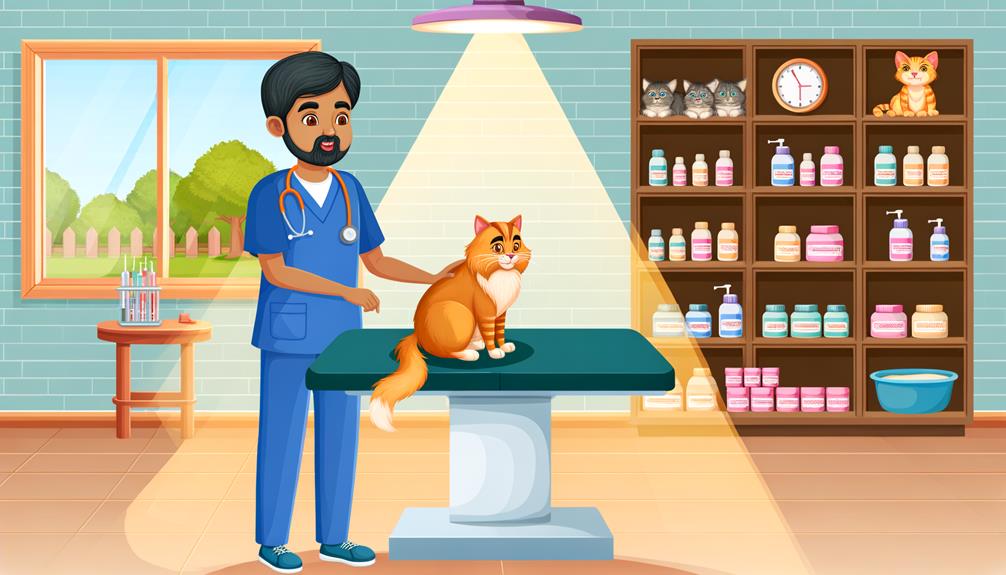
Regular vet visits are essential for keeping your cat smelling good and maintaining overall health. It's not just about routine check-ups; these visits can help identify underlying health issues that may lead to unpleasant odors. For instance, dental disease is a common problem in cats, often causing persistent bad breath. If you notice this, it's vital to schedule a vet visit for professional cleaning and assessment.
Furthermore, skin infections or conditions can also produce an unpleasant odor. During a veterinary consultation, your vet can diagnose and treat these issues effectively. Ensuring your cat's skin is healthy can greatly reduce the chances of odor problems.
Keeping your cat's vaccinations and deworming schedule up to date is another important aspect covered during vet visits. These preventive measures contribute to your cat's overall health, which in turn helps maintain their natural freshness. Remember, early veterinary intervention can prevent complications from unresolved health issues, which might otherwise lead to persistent odors.
Here's a quick overview of how vet visits can help:
| Health Issue | Signs | Reason for Vet Visit |
|---|---|---|
| Dental Disease | Persistent bad breath | Professional cleaning, assessment |
| Skin Infections | Odor, itching, redness | Diagnosis, treatment |
| Vaccinations | Preventive care | Maintain overall health |
| Deworming | Preventive care, reduces odor risk | Maintain overall health |
Regular vet visits aren't just about keeping your cat smelling good; they're about ensuring they live a healthy, happy life. By addressing dental disease, skin infections, and keeping up with vaccinations, you're doing your part to maintain your cat's well-being and natural freshness.
